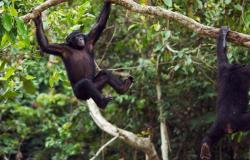LUANA LISBON
SÃO PAULO, SP (FOLHAPRESS)
Cities in Minas Gerais with an average daily minimum temperature of 21.2 °C had more cases of dengue over a period of ten years, according to a study carried out by researchers from UFJF (Federal University of Juiz de Fora).
The results of the research were published this Monday (25), in the journal Cadernos da Saúde Pública. Minas Gerais is one of the places with the highest incidence of probable cases of dengue this year.
According to the research, the incidence of dengue fever and the minimum atmospheric temperature have a relationship that researchers call non-linear (that is, they do not increase equally to each other). Depending on the intensity, this variable can be a risk or protective factor: moderate and extreme cold works as a “protective” factor and moderate heat is associated with a greater risk of infections.
The analysis used a survey of average daily temperature variation over a period of ten years (from 2010 to 2019), in 66 microregions of Minas Gerais. However, only 38 of them were considered, as some did not record enough dengue cases for analysis. Data on dengue cases are from DataSUS and climate data is from ECMWF (European Center for Medium-Term Weather Forecasts, in English).
The variation in minimum temperatures —generally recorded in the early morning hours— was wide: from 2.5 °C, in Pouso Alegre, in the south of Minas, to 26.5 °C in Frutal and Ituiutaba, both in the west of the state. The incidence of dengue fever during the analysis period was lower in regions with an average daily minimum temperature of 11.6 °C to 13.7 °C, classified as extreme and moderate cold by the researchers.
The incidence also decreased slightly in cities with an average daily minimum temperature of 22.4 °C, classified as extremely hot by researchers.
“Minimum temperatures are the most used in studies of this type. The idea is that because it is a borderline temperature, it is correlated with warmer temperatures and also captures the effect of cold, which can be limiting for the development of the mosquito”, explains the co-author of the research, João Pedro Medeiros.
Temperatures influence both the survival of Aedes aegypti and the dengue virus. Previous studies had already shown that the ideal temperature range for mosquito development is 16 °C to 34 °C. At air temperatures lower than 8°C, mosquito larvae do not move and die within a few days, while the adult mosquito is unable to move at temperatures lower than 10°C.
According to Medeiros, however, it was observed that the temperature did not act the same way in all cities, as there are other factors that influence the number of cases, such as access to healthcare and basic sanitation.
Variables such as dengue education and prevention campaigns, type of urbanization, spatial distribution of housing, residence pattern and population mobility were highlighted as phenomena with the potential to affect the incidence of the disease, but were not analyzed in the research.
Another important variable for the study was time, which depends on the biology of the mosquito, such as reproduction, and epidemiological dynamics, which consists of the incubation time of the virus in the vector, the inoculation of dengue in a human host, the incubation in the human host and demand for health services.
For the researcher, the study can serve to identify regions with a higher risk of cases, considering that there is a cyclical nature of dengue epidemics. In the data presented, epidemics become more intense every three years and there is a greater notification of cases in the months of December and June.
“We need to understand how the dynamics of the disease work to act preventively and not wait for the heat wave to start searching for mosquito outbreaks.”
According to research by the Institute of Scientific and Technological Communication and Information in Health of Fiocruz (Fundação Oswaldo Cruz), the constant heat waves resulting from climate change associated with incomplete urbanization and the large circulation of people in certain areas are favoring the expansion of dengue fever to the Brazilian interior.
According to an article by researcher Christovam Barcellos, the expansion of the disease in these regions is directly associated with the increasing frequency of extreme weather events, such as droughts and floods. The author also cites environmental degradation, especially in the cerrado, as an important influence.
There is already evidence that global warming, caused by human activity, has caused an increase in infectious diseases throughout the world, especially arboviruses, transmitted by mosquitoes. Records of autochthonous cases (which occur locally and are not brought from outside) of dengue in some European countries, such as southern France, Spain and Italy, are directly linked to climate change, according to researchers from the WHO (World Health Organization). Health).
Tags: Dengue cases higher cities higher temperatures study shows
--




